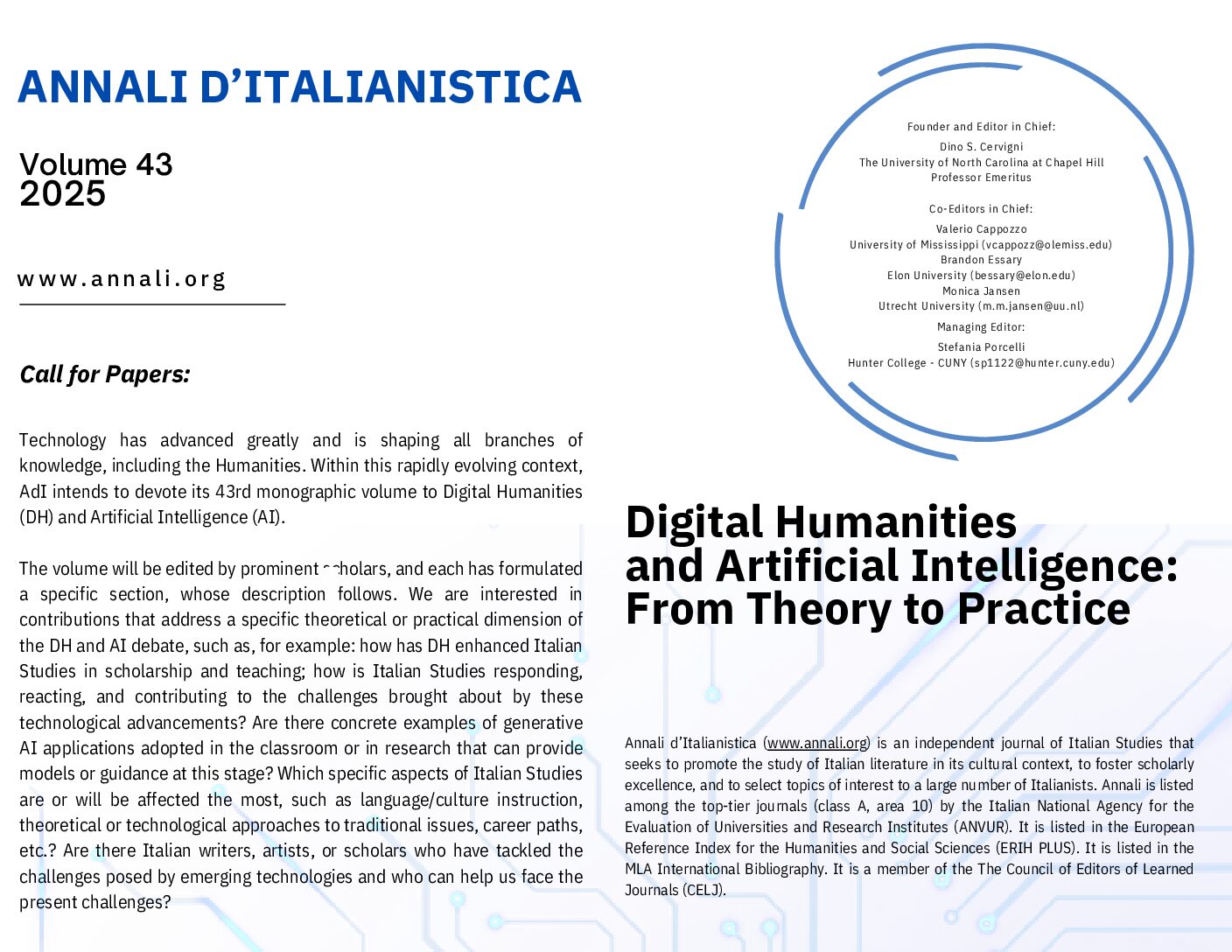
CFP Digital Humanities and Artificial Intelligence: From Theory to Practice – “Annali d’Italianistica”
Volume 43 – 2025
https://annali.org/upcoming/
****
Technology has advanced greatly and is shaping all branches of knowledge, including the Humanities. Within this rapidly evolving context, AdI intends to devote its 43rd monographic volume to Digital Humanities (DH) and Artificial Intelligence (AI). The volume will be edited by prominent scholars, and each has formulated a specific section, whose description follows. We are interested in contributions that address a specific theoretical or practical dimension of the DH and AI debate, such as, for example: how has DH enhanced Italian Studies in scholarship and teaching; how is Italian Studies responding, reacting, and contributing to the challenges brought about by these technological advancements? Are there concrete examples of generative AI applications adopted in the classroom or in research that can provide models or guidance at this stage? Which specific aspects of Italian Studies are or will be affected the most, such as language/culture instruction, theoretical or technological approaches to traditional issues, career paths, etc.? Are there Italian writers, artists, or scholars who have tackled the challenges posed by emerging technologies and who can help us face the present challenges?
The Editors of the volume welcome approaches focusing on both theory and practice according to the following five thematic sections:
I Artistic Practices and AI in Italian Studies. To be edited by Adele Bardazzi (a.bardazzi@uu.nl) This thematic section delves into the intersection of contemporary Italian literary works, including intermedial works, and recent advancements in AI with the aim to investigate to what extent, if at all, it can be helpful to approach these works from an Italian Studies perspective. The inquiry thus intends to investigate how to situate AI-generated works within Italian Studies as well as World Literature. We welcome contributions focusing on questions of authorship, originality, and creativity.
II Digital Game-Based Scholarship, Teaching, and Learning. To be edited by Brandon Essary (bessary@elon.edu) Video games are ubiquitous. According to a substantial body of research in the Scholarship of Teaching and Learning (SoTL), they are powerful teaching and learning tools. Many games have complex narratives imbued with literary elements that treat serious topics. These games offer the chance to engage students and scholars with the study of Italian literature, culture, history, and the humanities more broadly, in an engaging, digital way.
III Author and Authorship Between DH e AI. To be edited by Paola Italia (paola.italia@unibo.it) Through DH and AI, the authorial function can be investigated in all types of manuscripts: from autograph to apograph, and from apocrypha to fake. The application of automated methods to famous literary cases have shown the usefulness of an integrated approach not only in the resolution of philological cases, but also in investigating more analytically the mechanisms of literary creation and the multiple forms in which authorship expresses itself at the moment of fragmentation and sharing in the digital ecosystem of textual responsibility.
IV The AI Emergenc/e/y. To be edited by Massimo Riva (massimo_riva@brown.edu) As generative AI applications, Chatbots and similar technological advancements become more accessible and pervasive, at a societal level, scholars and teachers of Italian Studies face both theoretical and practical dilemmas. Combined with other pre-existing pressures targeting in particularly the humanities, these new difficulties may perhaps amount to an existential challenge to our profession, in addition to many others. This section intends to look at concrete applications of generative AI in the classroom or in research that can provide models or guidance at this stage of technology.
V Born-Digital Literature and Hybrid Archives. To be edited by Michelangelo Zaccarello (michelangelo.zaccarello@unipi.it) In the last decades, hybrid archives, which combine paper materials with digital (usually magnetic) resources, have flourished. This section seeks to investigate the first authors to adopt a personal computer for their literary creations, and to assess the difficult task of securing their documents, conceived and written in digital form, as well as to evaluate the normative practices for their acquisition and preservation, integrating them into a methodologically sound editing protocol. This volume will be published in the fall of 2025. Interested scholars are invited to contact the appropriate guest editor of the theme related to their topic, submit a 300- word abstract, and provide a short biographical note. The abstract and biographical note will be due by 31 December 2023. Guest editors will provide to each contributor guidelines to follow and deadlines to respect. Articles will be due by September 2024. Early submissions are encouraged. Authors should write in the language they are most familiar with, either Italian or English. Typically, articles range between 6,000 and 10,000 words. They should conform to the style-sheet of Annali d’italianistica for “Notes” and “Works Cited” (https://annali.org/publishing/). All articles will be refereed according to the peer-review policy of the journal (https://annali.org/peer-review-statement/).
Leave a Reply